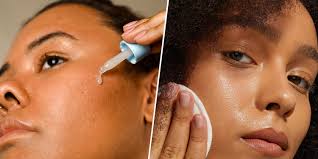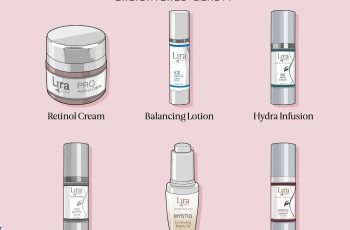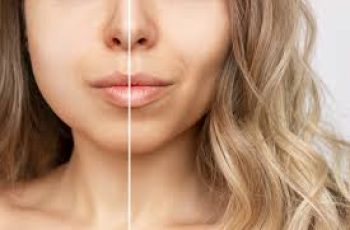Can You Use Mandelic Acid Every Day?
It’s easy to see why the thought of using acids on your skin can be scary. Things get more complicated when the acid in question isn’t as well-known as others, like glycolic and salicylic. Mandelic acid isn’t necessarily a new
ingredient, but it’s still niche enough that it doesn’t attract attention, as only the truly obsessed skincare fans know about its benefits and incorporate it into their skincare routines.
Not to worry, because if you’ve been wondering what mandelic acid is and how it can benefit your skin, this next section is for you.
What is Mandelic Acid? How does it benefit the skin?
Mandelic acid is a member of the AHA family, also known as an alpha hydroxy acid. She derives from others, as she is considered one of the gentlest.
Derived from bitter almonds, it is formulated into a variety of skin care formulations.
Exfoliates the top layer of skin to remove all accumulated dead skin cells, bacteria, dirt, debris and other impurities.
It also works deep into pores to remove excess sebum, dirt, and bacteria that can cause whiteheads, blackheads, and other blemishes.
Speeds up cell turnover and helps break the bonds that hold skin cells together. By removing dead skin cells, the complexion appears more radiant, vibrant, with a healthy glow.
Fine lines and wrinkles are visibly reduced and skin feels firmer thanks to an extra boost of collagen production, which helps fight the signs of aging.
Reduces the amount of melasma on the skin, making areas of hyperpigmentation lighter and more even-toned.
Contains antibacterial properties and the ability to regulate the skin’s sebum production, making it an extremely beneficial ingredient for acne-prone skin.
If you want to know more about the benefits of mandelic acid, check out our dedicated blog post.
When should mandelic acid not be used?
Although mandelic acid is considered the mildest of all acids, it can still cause irritation and increase the risk of allergies. To avoid this, I recommend avoiding mandelic acid with retinol, especially if you’re unfamiliar
with using the two ingredients. If you plan to have a mandelic acid chemical peel, avoid retinol completely for two weeks before and one week after treatment.
You should also avoid applying mandelic acid to sunburned or tanned skin. This is because the acid is too strong, leading to increased irritation, dryness, redness, and itching. Although mandelic acid is mild, it’s best combined
with moisturizers like hyaluronic acid or niacinamide to help lock in moisture and keep skin healthy, happy, and hydrated.
If you are concerned about using mandelic acid or any other acid, seek the help of a dermatologist or other healthcare professional to avoid unwanted side effects.
Can I take mandelic acid twice a day?
Yes, in fact, most skincare experts recommend using mandelic acid twice a day. That doesn’t mean you should start using it twice a day right away, but one at night is recommended. You can use it twice daily once skin tolerance
develops.
Thanks to the antioxidant properties of skin acid, when applied to the skin in the morning, it protects the skin from free radical damage such as pollution, UV rays and other environmental influences. Once you reapply mandelic
acid at night, the same antioxidant properties will work on the damage that has already occurred. They repair and rejuvenate the skin while fighting signs of aging, loss of firmness, sun damage and a dull, dull complexion.
Given that everyone’s skin is different, not to mention how different our skincare routines are, it’s important to remember that what works for one person may not work for you. So if you’ve tried mandelic acid twice a day and
found it’s too much for your skin, there’s nothing wrong with not using it once a day.
Does Mandelic Acid Cause Acne?
Yes, it is possible in the initial stages of introducing it into everyday life. Also known as “detoxing,” these breakouts are a common result of using chemical peels, especially if you’ve never had chemical peels on your skin.
The reason for this skin cleansing is accelerated skin cell turnover, which is caused by peeling, which then pulls out the pores and all the “residue” in the underlying layers of the skin. Once the buildup of impurities reaches
the surface, blemishes such as blackheads, whiteheads and active spots appear.
Clear skin can be daunting, but it’s only a short-term concern, as many people experience these results and clearer skin after up to two weeks. If you have other acne problems, it could be an allergic reaction. Therefore, I
recommend that you stop using mandelic acid products and seek further advice from your doctor.
How is mandelic acid routinely used?
A lot depends on which product the mandelic acid is formulated in. That’s because when it comes to skincare, there’s a cardinal rule of applying products in the right order: start with the thinnest consistency and build up to
the thickest formula. For example, start with a cleanser or face wash, toner, serum, face oil, moisturizer and finish with a daily SPF. By making sure you use these products in the correct order, you can avoid active ingredients
competing with the physical barrier that thicker products create on the skin’s surface.
There you will learn more about the daily use of mandelic acid. If you have any other questions you can reach me on our Instagram. We look forward to your visit
DQH Knowledge drop: In your 20s, your skin cell turnover decreases. (Cell turnover is a key component in keeping your skin youthful.) You know what else slows down? Your collagen production. Starting in your 20s, collagen decreases by about 1 percent per year. Should you want to prevent fine lines and wrinkles, start by eliminating behaviors that contribute to premature aging. “If it’s bad for you, it’s bad for your skin,” says dermatologist Michel Somenek.
“Cigarette smoking reduces blood flow to the skin and causes premature wrinkling and a dull skin texture. Making the repeated pursed motion to inhale can also cause smoker’s lines. Alcohol and recreational drugs are toxins for the skin that damage its cellular structure and DNA,” Somenek tells us. “The faster you eliminate vices while you are young, the better chance your skin and body have to recuperate.” Also, adopting an anti-aging routine in your 20s is key. After all, the best offense is a good defense. We spoke to Somenek and experts Joshua Ross and Audrey Kunin to find out more.
Keep reading for the best anti-aging products for your 20s, according to skincare professionals.
Sunscreen
“We all know that the sun is the number one cause of skin aging and starting the prevention in your 20s is very important,” Ross says. “The majority of your sun damage won’t start to appear until you’re in your 30s, so don’t wait until you see it surface or you’ll be behind the curve. Stay ahead of it with a good-quality zinc-based sunscreen worn daily.”
Farmacy Green Defense Daily Mineral Sunscreen
An invisible sunscreen with SPF 30, plus botanical extracts meant to protect skin with tons of antioxidants. Bonus: It’s clean and fine to use under makeup.
Bareminerals Complexion Rescue™ Tinted Moisturizer Broad Spectrum SPF 30
Although we recommend you use your SPF and moisturizer separately, we also understand moments when you don’t have time or energy for that extra step. For those times, this bareMinerals moisturizer is a great thing to have on hand.
Vitamin C Serum
“A great introduction to anti-aging is to start with a vitamin C serum in your morning skincare routine,” Ross says. “It’s a powerful antioxidant that will neutralize free radicals and brighten the skin.” He adds that it’s a great way to counteract the effects of the sun’s harmful rays, which, as previously mentioned, are among the biggest causes of premature aging.
Drunk Elephant C-Firma™ Vitamin C Day Serum
The Drunk Elephant C-Firma is a lightweight serum that promises to give skin a glow by combining the brightening powers of vitamin C with ferulic acid, l-ascorbic acid, and vitamin E. The included sodium hyaluronate is meant to replace hydration loss, so you shouldn’t have to deal with any irritation.
Sunday Riley C.E.O. Rapid Flash Brightening Serum
This potent serum is jam-packed with vitamin C (15 percent, to be exact), which means it’s a potential superstar at both brightening skin and dousing it in antioxidants.
Peptides
Using peptides on your skin has many benefits, says Somenek. “The skin barrier is what defends the body against pollution, UV rays, bacteria, and toxins. It can be damaged by several everyday factors. Using topical peptides aids in building a stronger barrier,” he says. “Peptides comprise elastic fibers, which are a type of protein. These fibers help to make skin appear taut and firm. Peptides can also help repair damaged skin, relieve inflammation, and even out skin tone. Some peptides can kill acne-causing bacteria that is common in 20-somethings.”
Kunin agrees, saying, “Peptides are an excellent entry point for supporting collagen.” She recommends looking for face and eye treatments that contain these collagen-boosting powerhouses.
Charlotte Tilbury Magic Eye Rescue Cream
This Charlotte Tilbury super-emollient eye cream has a base of coconut oil and shea butter (read: it’s incredibly hydrating). Botanicals plus peptides are meant to help reduce dark circles and boost collagen, respectively.
This creamy moisturizer serves up potent collagen-boosting peptides and pycnogenol, and antioxidant-rich vitamin C. “Instead of sitting on top of the skin, peptides penetrate the outer layer so they go deep. The ‘signals’ they send tell the cells to produce elastin and collagen, which are needed for youthful-looking skin,” explains Somenek.
At-Home Peel Pads
Remember that skin cell turnover fiasco we talked about earlier? One way to help support it is by exfoliating. “Exfoliation is important to help keep skin fresh and luminous,” Kunin says. She recommends using at-home peel pads as an easy and effective way to exfoliate.
“The goal in your 20s is to fight the slowing pace of cell turnover. It is wise to use products that gently exfoliate, yet still remove oil and other impurities. Products that have Alpha Hydroxy Acids (AHA) or Beta Hydroxy Acids (BHA) are a good choice.”
According to Somenek, you should only exfoliate two to three times a week. “People of all ages are guilty of over-exfoliating and that can be too much of a good thing,” he says.
Dermadoctor Kakadu C Intensive Vitamin C Peel Pad
A few swipes of this Derma Doctor powerful peel pad promise to leave your skin glowing and smooth, thanks to the seven (yes, seven) types of chemical exfoliants, including AHA and BHA. It also contains vitamin C via Kakadu plum extract for added brightening and antioxidant protection.
KEY INGREDIENTS Kakadu plum extract is sourced from the Kakadu plum, a fruit grown in northern Australia. It contains vitamin C, which restores the skin’s natural barrier, increases collagen production, and soothes irritation.
Dr. Dennis Gross Skincare Alpha Beta® Universal Daily Peel Pads
These are the gold standard of peel pads, with a cult following and over 900 five-star reviews on Sephora. They’re easy to use and contain a blend of anti-aging exfoliating acids.
Emollient Night Cream
“In your 20s, you need to start upping the hydration in your skincare routine. You may have been cautious of over-moisturizing because of acne in your teens, but as you enter your 20s, your skin transitions and becomes drier,” Ross says. “I recommend an emollient night cream added into your evening skincare regimen.”
“Twenty-somethings need to make sure that they are not using creams that will clog their pores and cause excess oil production,” says Somenek. Opt for non-comedogenic products.
Cerave Skin Renewing Night Cream
One great choice is the CeraVe Skin Renewing Night Cream, which is a non-comedogenic night cream that leaves skin soft and glowy. It combines the moisturizing powers of ceramides and hyaluronic acid.
RoC Retinol Correxion Max Hydration Creme
“The best night cream ingredients contain retinol, benzoyl peroxide, and/or salicylic acid or hyaluronic acid. The goal is to moisturize, yet remove excess oil,” says Somenek. This Roc Retinol Correxion cream fits the bill as it contains both hyaluronic acid and retinol so it promises to moisturize while also being non-comedogenic.



